
Vietnam is now increasingly emerging as a regional middle power, especially in the global supply chain and development of 5G technology, according to an article published by the UK’s website strifeblog.org on April 13.

Deputy Prime Minister Vu Duc Dam said at working session with the Ministry of Science and Technology on April 13 that breakthroughs in science-technology are needed for the country to gain speed in development.
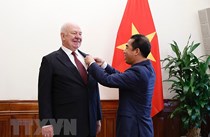
Outgoing Russian Ambassador to Vietnam Konstantin Vnukov has expressed his positive impression of Vietnam and its people and shared his assessment of the prospects for developing the partnership between the two countries in the time to come.
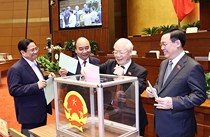
A Russian analyst has talked about the new leadership of Vietnam in a recent interview with the Vietnam News Agency, highly valuing the virtue and capacity of the country’s newly-elected leaders.
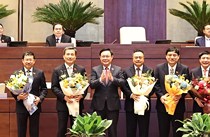
The National Assembly (NA) passed a resolution on the election of chairpersons of a number of NA Committees on April 7, with approval of all 463 deputies present at the session.
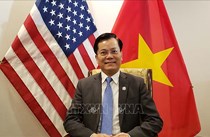
Vietnamese Ambassador to the US Ha Kim Ngoc held phone talks with Ami Bera, a Democratic congressman representing California and Chairman of the Subcommittee on Asia, the Pacific, and Nonproliferation at the House Foreign Affairs Committee, on April 5.
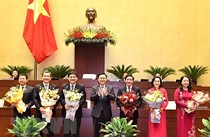
The National Assembly (NA) adopted a resolution on the election of members to the 14th NA’s Standing Committee during its ongoing 11th sitting on the afternoon of April 6.

The 14th National Assembly relieved several members of its Standing Committee through secret ballots at the ongoing 11th meeting on April 6 morning.

The Khanh Hoa-based Institute of Vaccines and Medical Biologicals under the Ministry of Health in coordination with PATH organisation has jointly studied a COVID-19 vaccine called Covicac, which uses egg-based vaccine production technology.

Vietnam is working to realise its goal of being listed in Top 4 in ASEAN and Top 50 of the world in terms in artificial intelligence (AI) research, development and application by 2030.
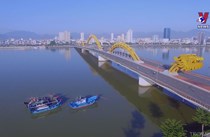
According to Da Nang’s adjusted planning by 2030 and a vision to 2045, a number of large-scale projects are to be built in the central coastal city. These are expected to turn it into a coastal urban area that plays a role as a growth driver in the central region.

Deputy Prime Minister Trinh Dinh Dung has asked authorities of central Da Nang city to seize opportunities and make the best use of local potential and advantages to grow rapidly and sustainably.

The processing and manufacturing sector took the lead in attracting foreign investment in the first three months to March 20, absorbing over 5 billion USD, or 49.6 percent, announced the Foreign Investment Agency (FIA) at the Ministry of Planning and Investment.
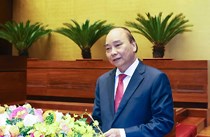
Prime Minister Nguyen Xuan Phuc pointed out the three key components of the socio-economic development strategy for 2021-2030 while speaking on the second day of a national teleconference on March 28.
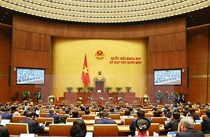
The 14th National Assembly continued the third working day of its 11th session on March 26.
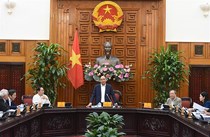
Prime Minister Nguyen Xuan Phuc chaired a meeting on March 23 of the board responsible for the compilation and publishing of a book on the history of the Vietnamese Government.

The 10 outstanding young Vietnamese and the 10 promising young talents in 2020 were honoured at a ceremony held by the Ho Chi Minh Communist Youth Union (HCMCYU) Central Committee and the Vietnam Young Talent Fund in Hanoi on March 21.
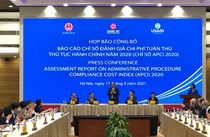
An annual report on the index for administrative procedure compliance costs in 2020 (APCI 2020) was released at a press conference on March 17 chaired by Minister and Chairman of the Government Office Mai Tien Dung, who is also Chairman of the Prime Minister’s Advisory Council for Administrative Procedure Reform.

Vietnam has been striving to improve its legal framework and policies on science and technology in order to boost productivity and economic competitiveness and make innovation a driver of growth.

Vietnam is one of the pioneering countries in building a national digital transformation programme, with the three main pillars of digital government, digital economy, and digital society.